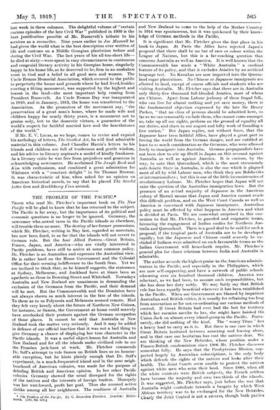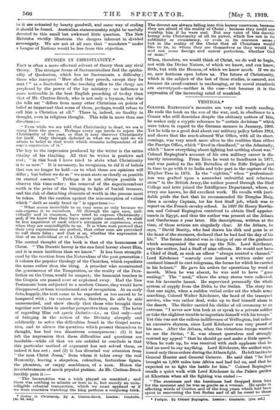THE PROBLEM OF THE PACIFIC.*
THOSE who read Mr. Fletcher's important book on The New Pacific will be glad to know that he has returned to the subject. The Pacific is far away, but the importance of its political and economic questions is no longer to be ignored. Germany, the newcomer who.sowed tares in the Pacific islands as elsewhere, will trouble them no more. The destiny of her former possessions, which Mr. Fletcher, writing in May last, regarded as uncertain, has now been fixed, in so far that the islands will not revert to German rule. But the four Allied Powers—Great Britain, France, Japan, and America—who are vitally interested in Pacific problems, have still to arrive at some common policy. Mr. Fletcher is an -Australian and expresses the Australian view. He is rather hard on the Home Government and the Colonial Office for their seeming indifference to the South Seas. Yet we are inclined to think that, as he himself suggests, the statesmen at Sydney, Melbourne, and Auckland have at times been as apathetic as those in Downing Street and Whitehall. Nowadays Australia and New Zealand are unanimous in demanding the exclusion of the Germans from the Pacific, and their demand will be met. But the Commonwealth and the Dominion have not always shown so much interest in the fate of the islands. To them as to us Polynesia and Melanesia seemed remote. Had they felt very keenly about the future of Northern New Guinea, for instance, or Samoa, the Government at home could scarcely have overlooked their protests against the German occupation of those places. It cannot be said that Australia or New Zealand took the matter very seriously. And it may be added in defence of our official inaction that it was not a bad thing to give Germany a chance of displaying her true character in the Pacific islands. It was a useful object-lesson for Australia and New Zealand and for all the islands under civilized rule to see the Prussian jack-boot at work. Mr. Fletcher commends Dr. Solt's attempt to rule Samoa on British lines as an honour- able exception, but he hints plainly enough that Dr. Solt 's experiment, in a much-frequented island and in the near neigh- bourhood of American colonies, was made for the purpose of deluding British and American opinion. In her other Pacific colonies Germany showed the usual disregard for the rights of the natives and the interests of foreign traders. Monopoly was her watchword, profit her goal. Thus she aroused active dislike among all her neighbours. The readiness of Australia • ,The Problem of the Pao*. By C, nruestou Fletcher. London: 14151- Iowa. LIN. ss. net.) and New Zealand to come to the help of the Mother Country in 1914 was spontaneous, but it was quickened by their know- ledge of German methods in the Pacific.
It is significant that Mr. Fletcher gives the first place in his book to Japan. At Paris the Allies have rejected Japan's proposal that there shall be no bar of race or colour within the
League of Nations, but this is a far-reaching question that concerns Australia as well as America. It is well known that the Commonwealth has made a " White Australia" a cardinal feature of its policy, and that it excludes Asiatics by an artificial language test. No Kanakas are now imported into the Queens-
land sugar plantations. No Chinese or Japanese immigrants aro allowed to land, except of course officials and students who are visiting Australia. Mr. Fletcher says that there are in Australia only thirty-five thousand full-blooded Asiatics, most of whom are Chinese. Apart from Labour jealousy of these frugal folk, who can live for almost nothing and yet save money, there is the fundamental objection expressed by the late Sir Henry Parkes, " that no class of persons should be admitted here, so far as we can reasonably exclude them, who cannot come amongst us, take up all our rights, perform on the ground of equality all our duties, and share in our august and lofty work of founding a free nation." But Japan replies, not without force, that the Japanese have been faithful Allies, have played a great part in freeing the world from the German danger, and are entitled at least to as much consideration as the Germans, who were allowed freely to immigrate into Australia. German propagandists have not been slow to stir up ilhvill in Japan on this account against Australia as well as against America. It is curious, by the way, to note that Queensland, which is the most strenuously anti-Asiatic State in Australia, is also the one which is plagued most of all by wild Labour men, who think they are Bolsheviks or internationalists ; but this is one of the little inconsistencies of revolutionary Labour. Mr. Fletcher hopes that Japan will not raise the question of the Australian immigration laws. But the presence of an actual majority of Japanese in the American colony of Hawaii means that Japan and America cannot evade this difficult problem, and on the West Coast Canada as well as America is concerned with Japanese immigrants. Australian policy must be affected by what happens in America and what is decided at Paris. We are somewhat surprised in this con- nexion to find Mr. Fletcher, in guarded and enigmatic terms, favouring the engagement of Indian coolies for Northern Aus- tralia and Queensland. There is a good deal to be said for such a proposal, if the tropical parts of Australia are to be developed rapidly; but the Japanese and Chinese could scarcely be ex- cluded if Indians were admitted on such favourable terms as the Indian Government will henceforth require. Mr. Fletcher's general plea for closer relations between India and Australia is admirable.
The author accords the highest praise to the American adminis- trators in the Pacific, and especially ill the Philippines, which are now self-supporting, and have a network of public schools educating over six hundred thousand children. America was reluctant, as we had been, to assume such responsibilities, but she has done her duty nobly. We may fairly say that British rule has been equally beneficial wherever it has been established in the Pacific. When our Government are blamed by impatient Australian and British critics, it is usually for refraining too long front annexation or for not co-ordinating our various methods of control. If Great Britain had ever had the lust for territory which her enemies ascribe to her, she might have hoisted the Union Jack on almost every island-group in the Pacific. Fortu- nately, she did nothing of the kind. The " weary Titan " has a heavy load to carry mit is. But there is one case in which Great Britain hesitated between annexing and leaving alone, and in that case our hesitation has cost the natives dear. We are thinking of the New Hebrides, whose position under a Franco-British condominium since 1906 Mr. Fletcher discusses somewhat fully. He says that the Presbyterian Mission, sup- ported largely by Australian subscriptions, is the only body which defends the rights of the natives and looks after their health. The Joint Courts seem unable to protect the natives against white men who seize their land. Since 1880, when all the white residents were British subjects, the French settlers have become the majority and own two-thirds of the islands. It was suggested, Mr. Fletcher says, just before the war that Australia might contribute towards a bargain by which West African territory was to be exchanged for the New Hebrides. Clearly the Joint Control is not a 'nieces/3, though both parties to it are actuated by hearty goodwill, and some way of ending it should be found. Australian statesmanship might be usefully devoted to this small but awkward little question. The New Hebrides vividly illustrate the dangers inherent in divided sovereignty. We are not at all sure that " mandates " under a League of Nations would be free from this objection.



































 Previous page
Previous page